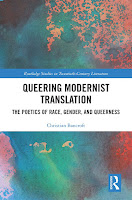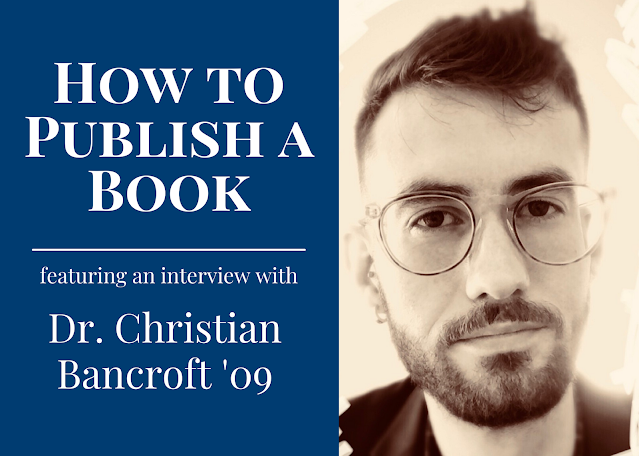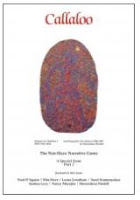How to Publish A Book: An Interview with Dr. Christian Bancroft '09
Dr. Christian Bancroft, Class of ‘09 (they/them), talks about the publishing process and the journey they took to become a published author.
 Complex, enigmatic, byzantine—all words used to describe the publication process. From the outside, it is hard to understand, and on the inside, it can be daunting to navigate. Dr. Christian Bancroft, a former Texas A&M English major who graduated in 2009, successfully undertook the challenge and published their first book, Queering Modernist Translation: The Poetics of Race, Gender, and Queerness. In the book, Dr. Bancroft explores three translations from Ezra Pound, Langston Hughes, and Hilda Doolittle (H.D.) through the lens of queer theory.
Complex, enigmatic, byzantine—all words used to describe the publication process. From the outside, it is hard to understand, and on the inside, it can be daunting to navigate. Dr. Christian Bancroft, a former Texas A&M English major who graduated in 2009, successfully undertook the challenge and published their first book, Queering Modernist Translation: The Poetics of Race, Gender, and Queerness. In the book, Dr. Bancroft explores three translations from Ezra Pound, Langston Hughes, and Hilda Doolittle (H.D.) through the lens of queer theory. While Queering Modernist Translation is a critical book based on research, Dr. Bancroft specialized in the creative writing track within their English major and was specifically interested in poetry during their time at Texas A&M. From the beginning, they always knew that they wanted to be a published author.
“Even back then, I was really determined to be a writer and to publish my work,” Dr. Bancroft said. “I had great mentors at A&M, and it really helped me get a better idea of the publishing world and get a foothold into that.”
After graduating from Texas A&M University, Dr. Bancroft got their Master’s in creative writing from the University of Texas, with a focus on poetry. Later, Dr. Bancroft earned their doctorate in literature from the University of Houston. They currently live and work in Pennsylvania as an English teacher and as a poet. During their doctorate program, the work they did on their dissertation eventually turned into their first book, published in July 2020.
“I really enjoyed the work that I did on my dissertation, and I really had a lot of fun with it. The people on my committee thought that it was really strong, and so I tried to see what I could do to get it published,” Dr. Bancroft said. While their first book was a critical book, Dr. Bancroft is currently working on three poetry books (an excerpt from one book is below) and hopes to initiate the publishing process for them soon.
While the publication process is complex, it also differs between different genres and styles of writing. For a book to be published, an author must query publishers with a letter that describes the book and why they think it is a good fit for the publisher. If the publisher is interested, they will request a sample. Once the author sends them sample pages, the publisher will decide if they are interested in seeing the whole book. For a critical book, such as the one Dr. Bancroft just published, the book will go through a peer review process by two or three experts in the field. These experts send notes and feedback about the book to the editor, who then decides whether or not it should be sent to a board for review.
For a book of poetry, fiction, or any other more commercial, mainstream book, the process looks different. For authors of their first, second, or even third poetry book, the manuscripts are usually sent out to contests or open reading submission periods, where it starts off in the slush pile. If the book is chosen after a couple of readers, it will move on to the next stage, and the process will repeat for however many stages that particular publisher has. The book will eventually end up in front of a judge or a series of judges who will narrow down the list. For more commercial fiction or nonfiction books, the author has the option to query an agent to advocate for them and their book on their behalf with publishers.
“It’s complex,” Dr. Bancroft said, speaking about the publication process. “I feel like, fortunately, because of my editorial experience at Texas A&M and afterwards, I had a glimpse into what it looked like.”
According to Dr. Bancroft, one of their most valuable experiences at Texas A&M was working at the literary journal, Callaloo. The journal was founded and edited by Dr. Charles Henry Rowell, a former professor of English at Texas A&M.
“It had a huge impact on me. I had a much stronger idea of what it was like behind the scenes in the publishing world, and Callaloo, being such a respected and renowned journal, you get to see these incredible writers from all over,” Dr. Bancroft said.
The experience at the literary journal introduced Dr. Bancroft to the world of publishing, making it much less intimidating when the time came for them to publish their own book. It also provided insight as to what would be going through an editor’s mind reading through the manuscripts or reading samples during the publication process.
Dr. Bancroft said, “It can make you a better writer because as an editor or from an editorial perspective, you can see what you like or what pops out to you. You need stuff to pop out to you and illuminate you in some regard when you’re reading after several hours. I think that’s something that writers really need to learn and understand when they start out—their piece is very likely not the first piece that [the editor] is reading for the day. They’re probably not looking at it with fresh eyes, and so you have to keep their attention for the whole thing.”
In addition to working at a literary journal during their time at Texas A&M, Dr. Bancroft also formed valuable connections with Texas A&M faculty, who served as mentors to them throughout their education, and provided them with inspiration and insight.
“Really any resources or networks that A&M or the Department can provide, I would say seek them out. Reach out to your professors, and ask them because they likely know if you don’t,” Dr. Bancroft said. “A&M was such a great place to start out for me. There was always something happening or something to learn about, whether it was a prize for a paper or a collection of poems that they were advertising. The professors themselves and the faculty—they know so much. I would really utilize those resources because there’s so much available.”
Getting a book published also takes a substantial amount of determination. From Dr. Bancroft’s experience, patience and kindness—with yourself and with your work—are key to any aspiring author seeking to be published.
“Be patient. There is not a level of patience that you need to acquire—you just need as much patience as possible,” Dr. Bancroft said. “Have patience with yourself and patience with the process because it takes time. Be kind to yourself throughout the process because you’re going to get a lot of rejections—that’s just the nature of it. The key is to not lose faith. Really have faith in the book that you have, and faith in yourself as a writer. If you’re determined enough, and if you stick with it then, I think you have a very good chance of getting that work published.”
Selected Poems from A Ghost Has No Fantasies by Dr. Christian Bancroft
[Note: The poems in
this submission are from a longer manuscript, A Ghost Has No Fantasies, and are engaged with bringing to light
and the reframing of the persecution of gay men and lesbians during the
Holocaust. These poems are found texts, taken from memoirs, first-hand
accounts, and archival documents that catalogue the persecution of queer men
and women during the Holocaust.]
Comrade
Pierre Seel
During machine gunning,
a blond
was killed at my side:
I took him
by the shoulders,
I talked to him,
I hugged him:
I loved
for three days
and
nights
with that dead man
next
to me:
after three days
he was starting
to ice
over:
those three days
left
me
with
an inexpressible
attachment
At First, I Saw Only His Face
Stefan Kosinski
No wind that night
early November in ’41,
but the presence of the Wisła[1]
still palpable: its density
always gripping the air
molecules
in Toruń with tenacity.
In one of the squares in Old Town
he approached me: nazistowski oficer.
Był piękny.[2]
Willi, his name, walked
me to my flat, kindly.
Night after night he did this.
He asked me about my work
in the theatre, my home…
I thought, What is he
doing, this Nazi Officer?
But he was from Austria.
One night, he asked to come into
my apartment—oh,
I felt trepidation, my
nerves overtaken by some crazed
tempest, hurling inside me.
Willi took me
in his arms and kissed me.
I was very romantic
as a Polish man, clutching
his wool uniform
and rumpling its tailored
creases along the arch
of his shoulder blades.
It’s not possible
to describe emotions
like that plainly. We were
the shape and history
of passion:
to hurt, to suffer,
to endure, strong
emotions and desires…
He brought me
an apple once,
and even an orange—
can you imagine, during the war?
They Didn’t Want to Hear About
It
Heinz Dörmer
I was released from prison
for the last
time in 1963.
Upon stepping outside, I felt
the vector of wind,
confident, drive east,
in the
direction of its choosing.
The sun, crouched on evening’s
horizon,
resembled blown glass:
its edges melting beyond the
atmosphere
in
colors that changed
too quickly for me to enjoy
for
a long stretch of time.
I couldn’t help but think
that I
would be in prison again
after being imprisoned for years
on and off—and after
internment at the camp.
This
feeling was visceral,
as though apprehension
were embedded in my bone marrow.
I was received by my father
back in Berlin.
Every time I returned
the city
grew more alien
from what I knew it to be
the last time I was
released from prison.
My father didn’t know why
I
was in prison, nor in the camps.
He thought it was because I
was some sort of political dissonant.
I was, in a way.
I would’ve liked to
have told him.
Nobody would want to hear about
it.
They would say,
I
don’t want to hear about that stuff!
It’s over and done with.
It’s over for me too.
I’ll be 93 in
September.
I was imprisoned for eight and a half years.
I was imprisoned for eight and a half years for loving.
Benno Premsala
I allowed myself to be a
feeling.
After
the war, I was twenty-five.
I would only have that moment once,
to
shape my life.
I was not just a profile of my
sexuality.
I felt invulnerable, free
from the fear, which prevents men
from
becoming a fire
used to forge themselves into
the world.
Neither my parents, nor
my sister
returned from the camps. Only my brother
survived.
Almost everything
and everyone, I had lost.
My
next move was clear.
Homosexuality was not accepted.
When
there is no place for us,
we must create a place.
We
must assert what we
are entitled to. I found it unacceptable
to lead
a double life just to hide
my sexuality. The worst thing that
could have happened
to me
did not happen.
Another life as some married man
was
unacceptable.
Instead of fleeing to yesterday,
my past,
I
took a step forward.
Tomorrow would emerge with or without me,
and
I wouldn’t abet my own extinction.




Comments
Post a Comment